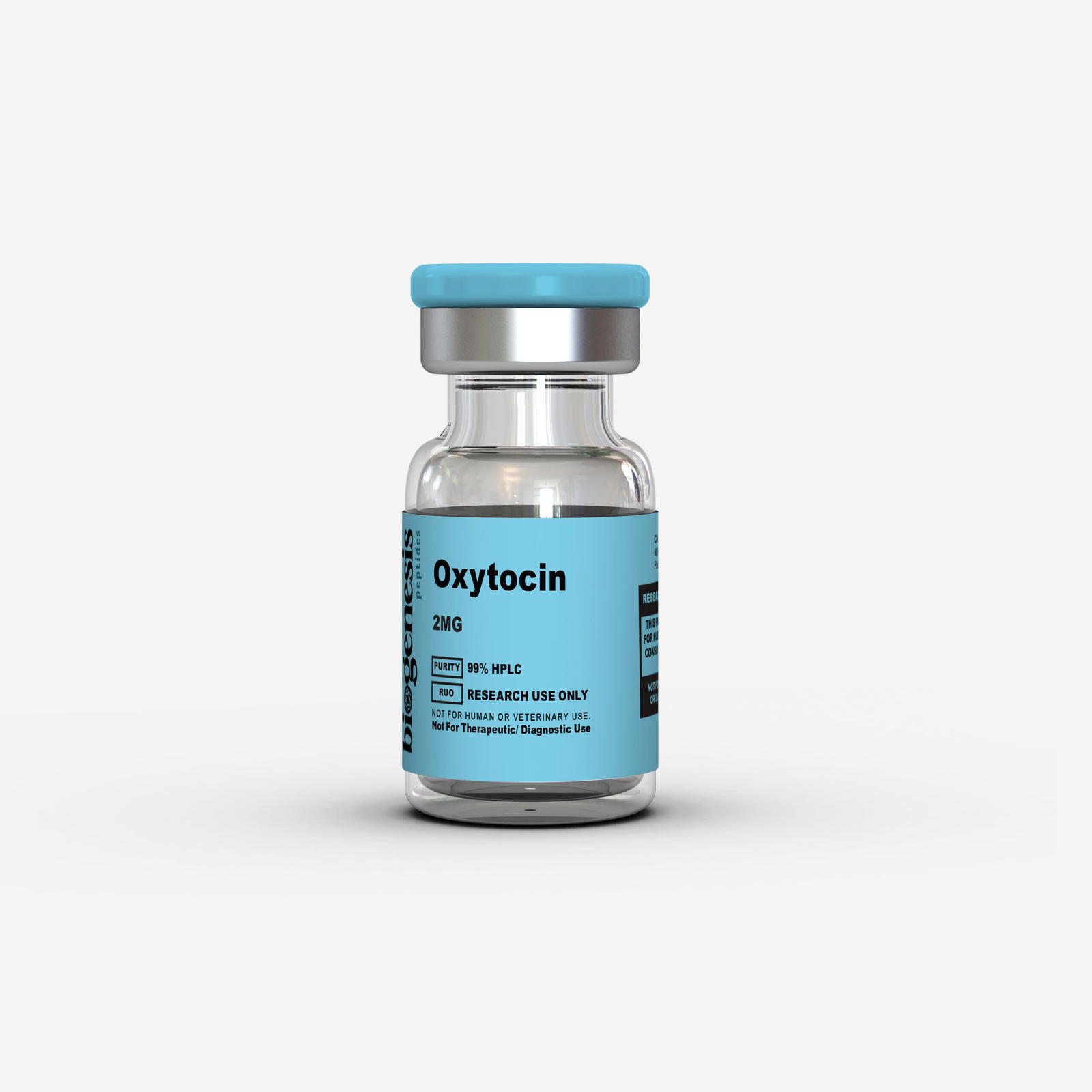Product Usage
THIS PRODUCT IS INTENDED AS A RESEARCH CHEMICAL ONLY. This designation allows the use of research chemicals strictly for in vitro testing and laboratory experimentation only. All product information available on this website is for educational purposes only. Bodily introduction of any kind into humans or animals is strictly forbidden by law. This product should only be handled by licensed, qualified professionals. This product is not a drug, food, or cosmetic and may not be misbranded, misused, or mislabeled as a drug, food, or cosmetic.
Oxytocin Acetate 2mg
Oxytocin is a naturally occurring peptide hormone with vital roles in social bonding, reproduction, wound healing, and metabolic regulation. Produced primarily in the hypothalamus and released by the posterior pituitary gland, oxytocin also exists in various tissues, including the placenta, ovaries, testes, and even the retina.
$40.00
Peptides will arrive in a lyophilized (powder) form for maximum stability
Out of stock
Buy 5 for 5% off
Buy 10 for 10% off
Buy 15 for 15% off
OVERVIEW
Oxytocin is a naturally occurring peptide hormone with vital roles in social bonding, reproduction, wound healing, and metabolic regulation. Produced primarily in the hypothalamus and released by the posterior pituitary gland, oxytocin also exists in various tissues, including the placenta, ovaries, testes, and even the retina.
Research suggests oxytocin may:
- Enhance social bonding and trust.
- Facilitate childbirth and breastfeeding.
- Accelerate wound healing and modulate immune function.
- Improve cardiovascular health by reducing blood pressure and atherosclerosis.
- Enhance insulin sensitivity and promote weight loss, making it a potential therapy for diabetes.
- Boost cognitive function and reduce symptoms of anxiety and depression.
Unlike many other peptides, oxytocin functions as both a neuropeptide and a blood-borne hormone, influencing numerous physiological and psychological processes.
RESEARCH
Oxytocin and Social Bonding
Often referred to as the “love hormone,” oxytocin plays a critical role in:
- Pair bonding and attachment in both men and women.
- Trust, empathy, and prosocial behavior.
- Reducing social anxiety and promoting positive social interactions.
Intranasal oxytocin administration has been shown to enhance social bonding and may help individuals with social anxiety disorders.
Oxytocin and Wound Healing
Oxytocin has demonstrated significant wound-healing properties:
- Higher oxytocin levels correlate with faster tissue regeneration.
- Clinical studies show couples with higher oxytocin levels healed 40% faster from minor wounds.
- Oxytocin modulates inflammatory cytokines (IL-6, TNF-α, IL-1β), reducing inflammation and promoting tissue repair.
These findings suggest potential therapeutic applications in post-surgical recovery and chronic wound management.
Oxytocin and Cardiovascular Health
Research indicates oxytocin may protect against heart disease by:
- Lowering blood pressure and improving heart function.
- Reducing atherosclerosis by increasing oxytocin receptor expression in blood vessels.
- Protecting against cardiomyopathy and ischemia-related damage in chronic heart conditions.
These findings suggest that oxytocin could play a preventive role in cardiovascular disease.
Oxytocin and Diabetes
- Enhances insulin sensitivity and glucose uptake, making it a potential therapy for type 2 diabetes.
- Studies in obese diabetic mice found that oxytocin reduced fasting glucose levels by 23% and total body fat by 19%.
- Human trials suggest intranasal oxytocin therapy may promote weight loss over an 8-week period.
Oxytocin’s ability to regulate metabolism makes it a promising candidate for obesity and metabolic syndrome treatment.
Oxytocin and Cognitive Function
- Supports neurodevelopment and learning.
- Mice deprived of maternal bonding exhibited cognitive deficits, which were reversed with oxytocin therapy.
- Modulates serotonin and dopamine levels, suggesting potential antidepressant effects.
Oxytocin’s role in brain plasticity and emotional regulation makes it a candidate for neurological and psychiatric therapies.
Oxytocin and Anxiety/Depression
- Genetic variations in the oxytocin receptor (OXTR) gene are linked to social anxiety disorder and borderline personality disorder.
- Intranasal oxytocin administration has been shown to reduce fear responses and enhance social interactions.
- Potential applications in PTSD and generalized anxiety disorder (GAD).
These findings suggest that oxytocin-based therapies could provide alternative treatments for mood and anxiety disorders.
STRUCTURE
- Molecular Formula: C₄₃H₆₆N₁₂O₁₂S₂
- Molecular Weight: 1007.193 g/mol
- Amino Acid Sequence: Cys-Tyr-Ile-Gln-Asn-Cys-Pro-Leu-Gly
- CAS Registry Number: 50-56-6
- PubChem Identifier: 439302
CITATIONS
- Gouin, J.-P. et al. Marital behavior, oxytocin, vasopressin, and wound healing. Psychoneuroendocrinology (2010).
- Kiecolt-Glaser, J. K. et al. Hostile marital interactions, proinflammatory cytokine production, and wound healing. Archives of General Psychiatry (2005).
- Reiss, A. B. et al. Oxytocin: Potential to mitigate cardiovascular risk. Peptides (2019).
- Wang, P. et al. Therapeutic potential of oxytocin in atherosclerotic cardiovascular disease: Mechanisms and signaling pathways. Frontiers in Neuroscience (2019).
- Jankowski, M. et al. Oxytocin and cardioprotection in diabetes and obesity. BMC Endocrine Disorders (2016).
- Plante, E. et al. Oxytocin treatment prevents cardiomyopathy observed in obese diabetic male mice.Endocrinology (2015).
- Kolukcu, E. et al. The effects of oxytocin on penile tissues in an experimental priapism model in rats.International Urology and Nephrology (2019).
- Ding, C. et al. Oxytocin in metabolic homeostasis: Implications for obesity and diabetes management. Obesity Reviews (2019).
- Altirriba, J. et al. Divergent effects of oxytocin treatment on adiposity and diabetes in obese mice.Endocrinology (2014).
- Barengolts, E. Oxytocin as an emerging treatment for obesity and dysglycemia: A review of randomized controlled trials and cohort studies. Endocrine Practice (2019).
All products on this site are for Research, Development use only. Products are Not for Human consumption of any kind.
The statements made within this website have not been evaluated by the US Food and Drug Administration. The statements and the products of this company are not intended to diagnose, treat, cure or prevent any disease.
Biogenesis Peptides is a chemical supplier. Biogenesis Peptides is not a compounding pharmacy or chemical compounding facility as defined under 503A of the Federal Food, Drug, and Cosmetic act. Biogenesis Peptides is not an outsourcing facility as defined under 503B of the Federal Food, Drug, and Cosmetic act.

